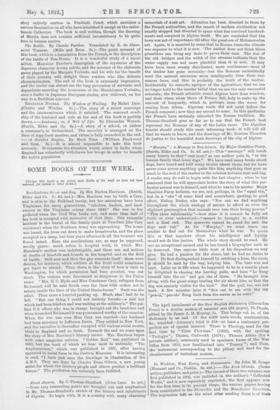Heritage. By Valentina Hawtroy. (Constable and Co. es.)— This novel
contains an account of the Pimbletts of Pimblett Court, and a most disagreeable, arbitrary set of people they are. Martin Pimblett, the central figure in the story, is almost un- naturally objectionable, and it is difficult to believe in the inflexi- bility of his self-will. His quarrel with Cyril Pimblett and hasty marriage are a little forced. It is all very well for the author to assert the fact that Martin suddenly conceives a hatred for Cyril because Cyril has gone to see Martin's actress mother who deserted him in his youth; but although it is quite certain there would have been a quarrel between the two men the reader is not convinced that Martin would have carried it so far. The marriage with Catherine, concluded within three weeks of his first meeting with her, is not convincing, though the best thing in the book is really the study of Catherine's character. Her develop went from a rather colourless girl into the mother defending her son from having his character forced into the Pimblett mould is finely described, and it is a pleasure to the reader to fmd that Martin suffers a terrible disappointment when his son Nicholas is grownup. Whether, however, he would have gone to the length of disinheriting Nicholas is to be doubted. Although Martin makes up his quarrel with Cyril, Cyril is only a few years younger than himself, and no guarantee is given that Cyril's son will be any more cn the Pimblett pattern than Nicholas himself. The
story entirely centres in Pimblett Court, which exercises a curious fascination on all who have inhabited it except on the unfor- tunate Catherine. The book is well written, though the drawing of Martin does not contain suffiCiont inconsistency to be quite truo to human nature.















































 Previous page
Previous page